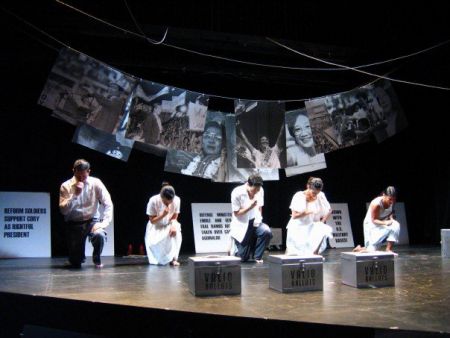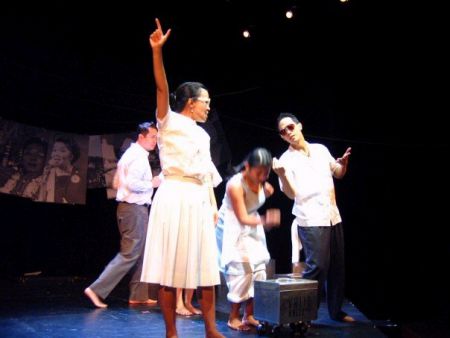“If I get shot in the head like Kennedy, I’m not going to fall down on my knees. When you get shot like that, you have a few seconds of life left. If that happens to me, I’m going to fall straight down with my arms spread so people will know I never gave up, even until the last second.”
These words belong to the late Ninoy Aquino, opposition leader to dictator Ferdinand Marcos, spoken immediately before he was killed in broad daylight upon returning from exile to the Philippines in 1983.
Three years later, the country would triumphantly erupt into peaceful revolution, overthrowing 20 years of dictatorship without a single death.
This and other catalytic moments in the build-up to the 1986 People Power Revolution unfold in Teesri Duniya Theatre’s current production, People Power, showing at Montreal’s Monument National until October 2.
People Power, the work of Toronto’s Filipino-Canadian theatre collective Carlos Bulosan, pulls the audience along from Aquino’s assassination to the knock of revolution on Marcos’ door.
Blending archival photos, songs, radio broadcasts, personalized struggles, and the collective’s own poetic reflections on the revolution, the play resembles a series of flashbacks that manages to transcend conflicting class differences and geographical space.
“I remember it being very chaotic,” says the Carlos Bulosan collective's award-winning director Nina Lee Aquino. She was a child in the Philippines during the revolution.
“My Filipino revolution was through the television, through newspaper clippings. Hence, if you see the stage, it’s very media-oriented with pictures, because that’s how I experienced it.”
The stage shifts steadily from one setting to another, such as a darkroom for a struggling photojournalist, a playground for street kids in Manila, an upper-class family’s dining room and, of course, the Epifanio de los Santos Avenue (EDSA) where most of the demonstrations took place.
Similarly, each of the five cast members morph in and out of roles, from the famous to the nameless, giving testament to the complexity of differing human narratives.
Yet the result is a sense of unity among conflicting truths.
“People Power is still one of the Philippines’ claim to fame of having one of the few, very few revolutions that were peaceful,” says Aquino.
“I felt like the entire country just gathered on EDSA those three days and prayed and chanted, and we beat them. No blood was spilled, nobody died. The Marcos soldiers eventually joined the other side and the nuns and the priests, the masses - rich and poor - were all together.”
At the height of “the revolution that surprised the world,” three million people had filled EDSA to put an end to the torture, imprisonment, and lack of civil liberties the US-backed Marcos dictatorship was imposing regularly.
“It’s one of the rare few moments in world history where that ever happened, where a country is united, says Aquino.”
The piece is clearly a celebration of what was accomplished in February, 1986. But it is also a critique, raising questions of what was truly gained and what has been left unfinished. Recently, peace in the Philippines has been ruptured by further political killings and the constantly widening gap between the rich and poor.
“The word ‘revolution,’ I think, is a catchphrase,” says Rahul Varma, artistic director of Teesri Duniya. “How could you say that we achieved our goals when 3000 people from the Philippines are leaving every day as domestic help in other countries?
“I’m saying, let’s use the word ‘revolution,’ and then examine it through panel discussions, through the reaction of the audiences.”
Varma asserts that although People Power may have taken place in the Philippines, the play is a “very Canadian” one, told through the eyes of a younger generation of Filipino immigrants in Canada.
“See, this is part of the evolution of Canada,” he says. “The international theme doesn’t have to be outside of our boundaries because the subject matters from many of these countries are living in this country, and they live with memories. In this case, the younger generation of Filipino-Canadians live with the memory of their parents protesting the dictatorship.
“So we created a history - a play - which basically recounts the evolution of a community here. To tell the stories of the world as Canadian stories.”
Creating dialogue is at the heart of Teesri Duniya’s (Hindustani for “Third World”) mandate, expressed through their maxim “Where the play’s wisdom ends, the audience’s wisdom begins.” Panel discussions featuring members of the Filipino community and talk-backs with performers will provide a forum for community and audience members to discuss important issues raised on stage over the next few weeks.
The goal, for Varma, is to change the world, one play at a time.
“If we look into the last century and how much calamity has been caused by war, genocide, and man-made human catastrophe, I can comfortably say that our only salvation is common understanding,” he says. “Therefore, since art is done with some beauty, with some aesthetic, it has the greater ability to engage. So we should use art to do that.”
For 30 years, Teesri Duniya has been serving socially and politically relevant theatre and popular education to the city of Montreal. What began as a basement project aimed at amplifying the voices of the South Asian community has resulted in a company at the forefront of an artistic movement to erase the margins of the dominant art world.
“I came [to Canada] in 1976 and was very interested in seeing how the country expressed itself through its artistic medium,” recounts Varma.
“What I saw was a total absence of people other than those from the dominant cultures - to be precise, white anglophones and white francophones. What was missing was anybody else. And that was very biting because when you walk down in the street, you see everyone. But you go in the theatre and you don’t see them.”
Varma responded by creating a theatre company based on a model of “interculturalism,” meaning that each culture represented would be given the artistic and political space to stand its own cultural ground without having to reconcile with others.
“We have to show our streets on our screens and on our stages because people need to feel the sense of belonging [in Canada],” he says. “They’ve committed themselves to this country and they don’t have to be an issue at a certain time - they have to be a constant presence in all our media outlets.
“So in some way, we are representing what the sum make-up of our country is, linguistically, politically, culturally.”
While the subject matter of People Power is clearly about revolution, according to Varma it is the interactive format of political theatre that changes the world.
“I think that a play is very controlled. It has set lines written by the writer, it has characters introverted in a certain way, but the audience is not controlled. They are open. What we do is to create a play that is not heavy-handed to a point that the audience feels detached from it or unengaged.
“We offer the content in the play that encourages them to speak more. And that’s what we say, that’s where their wisdom starts. It’s essentially dialogue.”
For more info please visit www.teesriduniya.com
Tickets: Adult $22, Senior $20, Student $15,
Group (10 or more) $14.





